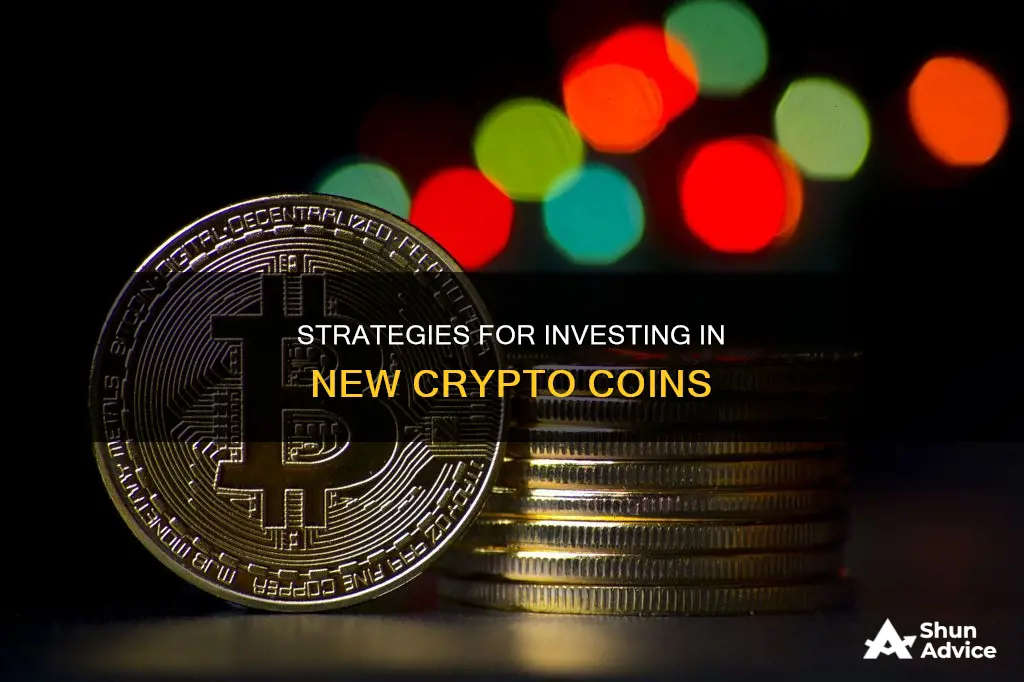
Investing in new cryptocurrencies can be a daunting task, with thousands of options available and more emerging all the time. When deciding where to put your money, it's important to do your research and understand the risks involved. Cryptocurrencies are highly volatile, and there is always the possibility of losing your entire investment.
When considering a new crypto coin, look at its white paper, which will detail its unique selling points, use cases, and roadmap for the future. Check out the project's website and social media presence to gauge its traction and popularity within the crypto community. Remember that a project's success will depend on its adoption, so buzz and trading volumes can be good indicators of its potential.
It's also essential to understand the tokenomics of a new crypto asset. Some new coins can surge in their early days, only to crash abruptly soon after. Due diligence is key when assessing new crypto investments.
Additionally, keep in mind the regulatory environment surrounding cryptocurrencies. While they are designed to be free from government control, the growing popularity of crypto has led to increased scrutiny and regulation by governments and financial authorities. This can impact the value and viability of certain coins.
Finally, when investing in new crypto coins, consider using a reputable crypto exchange or platform that offers a wide range of coins and tokens. Examples include Coinbase, Binance, and Kraken. These platforms provide an easy way to buy, sell, and trade cryptocurrencies, but always do your research on the specific platform and be aware of any associated fees and risks.
| Characteristics | Values |
|---|---|
| Number of cryptocurrencies | More than 8,000 as of June 25, 2024 |
| Cryptocurrency definition | Digital asset based on blockchain technology that can circulate without the centralized authority of a bank or government |
| Cryptocurrency use | Payments, transmitting value (akin to digital money) across a decentralized network of users |
| Cryptocurrency popularity | Bitcoin is the most popular, followed by Ethereum |
| Cryptocurrency volatility | Very high |
| Cryptocurrency risks | High, you can lose all your money |
| Cryptocurrency regulation | Not regulated investment vehicles |
| Cryptocurrency taxes | Cryptocurrency is treated as a capital asset, like stocks, rather than cash |
| Cryptocurrency exchanges | Binance, Coinbase, Kraken, Uphold, Gemini, Bitstamp, eToro, Bitcoin IRA, Crypto.com, M1 Finance |
| Cryptocurrency wallets | Stand-alone wallets like Electrum.org or hardware wallets like LedgerWallet.com |
| Cryptocurrency investment due diligence | Research the project, white papers, tokenomics, and be aware of the risks |
What You'll Learn

How to choose the best crypto exchange
With over 500 crypto exchanges to choose from, it can be challenging to decide which one is best for you. Here are some key factors to consider when making your decision:
- Security: The safety of your funds should be a top priority when choosing a crypto exchange. Look for exchanges that have robust security protocols, insurance for user funds, and SOC 2 certification. Avoid exchanges with a history of security breaches.
- Fees: Crypto exchanges typically charge trading fees and withdrawal fees, which can eat into your investment returns. Compare the fee structures of different exchanges and choose one with competitive rates. Also, consider whether there are any additional transaction fees or fund transfer fees.
- Supported Assets: If you want to trade cryptocurrencies beyond Bitcoin, check the list of supported assets on the exchange. Some exchanges offer a wide range of cryptocurrencies and tokens, while others only support a limited number. Choose an exchange that offers the assets you're interested in.
- Payment Methods: Different exchanges offer different ways to fund your account or purchase crypto. While most support wire transfers, some also allow credit card or debit card purchases. Select an exchange that provides the payment methods you require.
- Customer Service: If you're new to crypto or investing, you may need assistance at some point. Look for an exchange with a strong track record of providing excellent customer support. Read reviews and check the exchange's reputation to ensure they offer prompt and helpful responses.
- Reputation and Regulation: Research the exchange's reputation and regulatory compliance. Check for any recent news, customer reviews, and the exchange's history. Ensure the platform complies with Know Your Customer (KYC) and Anti-Money Laundering (AML) rules and is regulated by relevant authorities.
- Advanced Features: If you're an experienced trader, consider the advanced features offered by the exchange. These may include margin trading, futures trading, and advanced order types. Also, check for features like staking, lending, and crypto custody solutions.
- User Experience: Choose an exchange with a user-friendly interface that is easy to navigate, especially if you're a beginner. Some platforms offer a simple, intuitive platform similar to online banking apps or brokerage platforms, making it easier to transition to crypto investing.
Dogecoin: The Only Crypto You Need
You may want to see also

How to buy new cryptocurrencies
With thousands of cryptocurrencies out there, it can be challenging to keep track of new releases. New cryptocurrencies are often listed on smaller platforms first, where trading pairs link them to stablecoins such as Tether, as well as Bitcoin and Ethereum. They may not appear on major exchanges such as Binance or Coinbase immediately, so it could be some time before they are listed.
Choose a Broker or Crypto Exchange
You can buy cryptocurrencies through crypto exchanges like CoinDCX, Zebpay, Mudrex, and WazirX. These platforms tend to have more complex interfaces with multiple trade types and advanced performance charts, which can be intimidating for new crypto investors. They also offer user-friendly, easy purchase options.
Create and Verify Your Account
Once you decide on a cryptocurrency broker or exchange, you can sign up and open an account. Depending on the platform and the amount you plan to buy, you may have to verify your identity to prevent fraud and meet regulatory requirements.
Deposit Cash to Invest
To buy crypto, ensure you have funds in your account by linking your bank account or paying with a debit card.
Place Your Cryptocurrency Order
With money in your account, you're ready to place your first cryptocurrency order. There are hundreds of cryptocurrencies, ranging from well-known names like Bitcoin and Ethereum to more obscure cryptos like Theta Fuel or Holo.
Select a Storage Method
The Reserve Bank of India does not back cryptocurrency exchanges, so they are at risk of theft or hacking. You could even lose your investment if you forget the codes to access your account. That's why having a secure storage place for your cryptocurrencies is essential.
You have several options for storing your cryptocurrency:
- Leave the crypto on the exchange: When you buy cryptocurrency, it's typically stored in a crypto wallet attached to the exchange.
- Hot wallets: These are crypto wallets stored online and run on internet-connected devices like tablets, computers, or phones. They are convenient but carry a higher risk of theft.
- Cold wallets: Cold crypto wallets aren't connected to the internet, making them your most secure option. They are external devices like USBs or hard drives. However, if you lose the key code or the device fails, you may never access your cryptocurrency again.
Tips for Investing in New Cryptocurrencies
- Perform due diligence: Learn as much as possible about a project's tokenomics by reading white papers commonly found on a startup's website.
- Be cautious of early surges: Some new crypto coins can surge in their early days, only to crash abruptly soon after.
- Monitor social media and trading volumes: A project's success will depend on levels of adoption in the crypto community. Buzz on social media and trading volumes can indicate how much traction a project has.
- Be aware of the risks: Investing in any cryptocurrency carries risks. The value of cryptocurrencies can be extremely volatile, and there's also the risk that the project may not succeed. Therefore, it's crucial to do your research and understand your risk tolerance and investment goals.
Dash Coin Investment Guide for Indians
You may want to see also

How to research new crypto coins
Researching a new cryptocurrency is critical to your trading success. Here are some strategies to help you think critically, use reliable data, and make informed decisions when researching new crypto coins.
Make Smart Use of Social Media
Social media channels offer a great way to get a wider perspective and understand market sentiment. Follow experts in finance and the crypto arena, such as accredited investors, financial journalists, analysts, crypto celebrities, and entrepreneurs. Twitter is one of the most valuable tools for understanding market sentiment and the prevailing opinions on specific cryptocurrencies. Facebook groups like Crypto Coin Trader and Crypto Trader News can also provide an indication of trending coins, events, and market sentiment. Telegram can offer the latest updates, insights, and analysis, but be cautious of the legitimacy of specific groups and remain alert for bots and fake followers.
Analyze the Fundamentals
Analyze the fundamentals of any altcoin you are interested in investing in over the long term. Ask yourself how valuable the utility is. Is the coin doing something completely new, or is it providing the same service as other coins but better? Read the whitepaper and make sure you understand the underlying technology. If the project is making a smarter contract, learn how smart contracts function, what the innovation is, and how the improvement is achieved so you can evaluate if they can deliver on their promises.
Research Upcoming Events
Upcoming events are a great source of information when trying to predict the short-term trajectory of a specific cryptocurrency or the market as a whole. Use a crypto calendar application such as CoinMarketCal to get data on any coin you're interested in investing in, so you know what upcoming events will impact its immediate future. For example, a Bitcoin halving can have a significant effect on the price of Bitcoin and the entire market.
Follow the Numbers
Stick to the statistics and check a coin's transaction volume over a given period by consulting various exchanges like Binance and Kraken. The more exchanges you compare, the more accurate your insights will be. Also, consider using keyword tools like KWFinder and Ahrefs to see which coins and events are the most searched for at any given time, helping you assess crypto market sentiment.
Research the Team and Partners
Research the team behind a cryptocurrency or project. Look beyond a few names and titles on the website, and seek out information about team members' previous experiences, achievements, and qualifications on platforms like LinkedIn and Twitter. Reach out to the team and ask questions to gather more information and get a sense of their dedication. Also, look into the project's strategic partners. Established partners are vital as they help tap into additional resources, generate publicity, and provide learning opportunities. Analyze how the cooperation is portrayed on the website—the more detailed the information, the better.
Research the Project Website and Whitepaper
For new or smaller coins, information may not be as easily accessible as with larger, established platforms. Start by checking the project's website and whitepaper. Ask yourself: does the website look legitimate? Does it list important information such as a contact address, terms of use, and a privacy policy? Is the content up to date, well-written, and free of grammatical errors? Enter the website into a reputation checker like https://www.urlvoid.com/ to further assess its legitimacy.
Research Competitors
Understand the general market conditions and how the crypto project you're researching fits into that landscape by researching its competitors. Are there any competitors? If so, how are they different? How long have they been active, and how does their development compare? This will help you identify the project's competitive advantages and weaknesses and potentially uncover other promising projects.
Research Ways to Buy the Cryptocurrency
Find out how and where to buy the project's token or cryptocurrency. Can you buy them from an exchange, or do you need to send money to a contract? For crypto projects with an ICO (initial coin offering), tokens are usually not listed on an exchange before a certain date, meaning your funds will be locked up for a period. Also, consider the risks associated with smaller exchanges, which are more likely to get hacked or go bankrupt and may have lower liquidity, making it difficult to sell when you want to cash out.
Other Resources
- Messari: A cryptocurrency data aggregator with tools to analyze charts and make better trading decisions.
- Glassnode: An on-chain data and intelligence platform that gathers data from multiple blockchains to measure crypto network activity and provide insights to investors.
- LunarCrush: A social intelligence platform that analyzes data from social networks to gauge market activity, transaction data, and investor sentiment.
- Coin Metrics: A provider of cryptocurrency financial intelligence, market data, index information, and analysis tools.
- Santiment: A platform that provides on-chain, social media, and financial data on almost 2,000 cryptocurrencies, helping predict price movements.
- CoinGecko: One of the largest data aggregators that tracks cryptocurrency prices by market cap, providing an in-depth analysis of the crypto market.
- CoinDance: A heavy-data bitcoin research tool that tracks metrics such as hash rates, network nodes, fees, block sizes, and mining breakdowns.
- CryptoMiso: Ranks cryptocurrencies based on activity on GitHub, a platform where many crypto projects claim to be open source.
Remember, investing in cryptocurrencies is risky, so always do your own due diligence and make informed decisions.
How to Invest in Dogecoin: A Beginner's Guide
You may want to see also

How to spot a pump-and-dump crypto scam
Pump-and-dump scams are a common occurrence in the cryptocurrency market. The scheme usually involves a group of people buying a thinly traded asset, in this case, a new or obscure cryptocurrency, and then disseminating positive (often false) news about it to drive up its price. As more investors buy into the asset, the price continues to climb until the originators of the scam sell their stake at a profit, crashing the price and leaving the other investors with losses.
- Do your research: If you come across a relatively unknown cryptocurrency being promoted by strangers on the internet, take a step back and do your due diligence. Look up the token's white paper, determine who's behind it, what the objectives are, and whether there is any long-term potential for value increase.
- Check for development activity: If the token has been around for a while but there seems to be a lack of development activity or updates, it might be a red flag.
- Assess the project's purpose and realism: If the project has no clear purpose, makes unrealistic claims about its benefits, or has a poorly thought-out development roadmap, be cautious.
- Be wary of influencer promotion: If you suddenly see influencers or people with large followings who usually don't talk about finance or cryptocurrency promoting a particular crypto token, ask yourself why.
- Go to the source: Instead of relying solely on information from third parties, try to visit the project's website and social media pages directly to get first-hand information.
- Observe trading patterns: If you have access to the order book, check the trading volume patterns. Be cautious if you notice recent spikes in volume and big walls of buy or sell orders, as this could indicate a group of people manipulating the price.
- Look out for new tokens with rapid price increases: One of the biggest red flags is when an unknown token suddenly experiences a rapid and significant price rise.
- Be cautious of restrictions around selling: Some pump-and-dump scams, like the Squid Game token scam, restrict buyers from selling their tokens for a certain period. This allows the scammers to drive up the price even further before they dump their holdings.
- Pay attention to excessive hype: If there is a lot of sudden hype and FOMO-inducing messages on social media about a particular token or project, it could be a sign of an impending pump-and-dump scheme.
- Assess the token's utility: Look into the crypto project to see if it has a practical use case. If there doesn't seem to be a clear utility or purpose for the token, it might be used for a pump-and-dump scheme.
Remember, even well-known cryptocurrencies and exchanges are not completely immune to these scams, so always stay vigilant and do your research before investing.
Coinbase Alternatives: Exploring Crypto Investment Platforms
You may want to see also

How to create a well-balanced crypto portfolio
Creating a well-balanced crypto portfolio is essential for investors looking to maximize their returns while minimizing their risks. Here are some tips to help you build a robust and diversified cryptocurrency portfolio:
Diversify Your Investments
Diversification is a crucial aspect of any investment strategy, and it is no different when it comes to cryptocurrencies. By diversifying your crypto portfolio, you can reduce the impact of any single investment's performance on your overall returns. Spread your investments across various coins and tokens to lower the risk of losing all your money if one cryptocurrency fails.
Research and Due Diligence
Conduct thorough research before investing in any cryptocurrency. Understand the project's fundamentals, including its white paper, roadmap, team, and use cases. Assess the tokenomics, including the coin's supply, demand, and potential adoption rate. Remember, past performance is not always indicative of future results, so make decisions based on a combination of historical data and future potential.
Consider Market Capitalization and Volatility
Market capitalization, or market cap, is the total value of all a cryptocurrency's coins in circulation. It is a crucial factor in determining a coin's potential for growth. Generally, larger market cap coins like Bitcoin and Ethereum are considered less risky than smaller, more volatile coins. However, smaller coins may offer greater growth potential but also carry a higher risk of failure.
Risk Management and Stop Losses
Risk management is vital when investing in cryptocurrencies due to their volatile nature. Consider setting stop-loss orders to limit potential losses. A stop-loss order automatically triggers a sale of your crypto assets if they fall to a certain price, helping you avoid significant losses if the market turns against you.
Stay Up to Date and Monitor Your Portfolio
The cryptocurrency market is highly dynamic, and prices can fluctuate rapidly in response to news and market sentiment. Stay informed about the latest developments in the industry, and regularly monitor your portfolio's performance to make timely adjustments to your investment strategy.
Long-Term Investment Horizon
Cryptocurrencies are typically more suitable for long-term investors who can weather the short-term volatility and focus on the potential for significant gains over time. Avoid making impulsive decisions based on short-term price movements, and instead, maintain a long-term perspective when investing in and trading cryptocurrencies.
Security and Storage
Finally, ensuring the security of your crypto assets is critical. Consider using a combination of hot and cold wallets to store your cryptocurrencies safely. Hot wallets are online accounts or software that provide quick access to your coins, while cold wallets, such as hardware or paper wallets, offer more secure offline storage.
In conclusion, building a well-balanced crypto portfolio requires careful research, diversification, risk management, and a long-term investment horizon. Remember to stay informed, monitor your portfolio, and adjust your strategy as needed to maximize your returns and minimize potential losses.
Best Apps to Invest in Dogecoin
You may want to see also
Frequently asked questions
New cryptocurrencies may not appear on major exchanges like Binance or Coinbase immediately, so you may have to wait a while before they are listed. You can find out the name of the latest digital currencies, their symbol, and when they were added on websites like CoinMarketCap.
New crypto coins can surge in their early days, only to crash abruptly soon after. It's crucial to do your due diligence and learn as much as possible about a project's tokenomics. White papers, commonly found on a startup's website, often give a steer on this — detailing the digital asset's unique selling points, use cases, and roadmap for the future.
There are numerous new digital currencies being introduced all the time. These can range from projects with innovative new technologies to those aiming to solve specific problems within certain industries. It's important to keep an eye on these new currencies, as they can potentially offer interesting opportunities.
It's crucial to do your research and understand the project behind the cryptocurrency before making any investment decisions. Remember that the value of cryptocurrencies can be extremely volatile, so it's important to be prepared for the possibility of significant price fluctuations. Other things to consider include the speed at which transactions are completed, the fees associated with transacting, and the ability to use the cryptocurrency for regular purchases and bank transfers.







